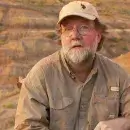
Sean B. Carroll
Dr. Sean B. Carroll is the Allan Wilson Professor of Molecular Biology and Genetics and the Vice President for Science Education at the Howard Hughes Medical Institute. An internationally-recognized evolutionary biologist, Carroll's laboratory research has centered on the genes that control animal body patterns and play major roles in the evolution of animal diversity. He showed that changes at the level of cis-regulatory elements play the major role in effecting morphological evolution as well as how cooption of regulatory networks contributes to the generation of novelty. A prominent science communicator in print, on radio, and on television, Carroll is the author of Remarkable Creatures: Epic Adventures in the Search for the Origins of Species, which was a finalist for the 2009 National Book Award for non-fiction, The Making of the Fittest, and of Endless Forms Most Beautiful: The New Science of Evo Devo. His first two books were the basis for, and Carroll was the scientific consulting producer of, a two-hour NOVA special that was first broadcast in December 2009 on the occasion of the 150th anniversary of Darwin’s On the Origin of Species. He also wrote a regular feature "Remarkable Creatures" for the New York Times Science Times. Carroll is also author of the student text Into The Jungle: Great Adventures in the Search for Evolution, co-author with Jen Grenier and Scott Weatherbee of the textbook From DNA to Diversity: Molecular Genetics and the Evolution of Animal Design and with Anthony Griffiths, Susan Wessler, and John Doebley of the textbook Introduction to Genetic Analysis. For his educational contributions, he has received the Stephen Jay Gould Prize for the advancement of the public understanding of evolution from the Society for the Study of Evolution, the Distinguished Service Award of the National Association of Biology Teachers, and the Viktor Hamburger Outstanding Educator Award from the Society for Developmental Biology, and numerous honorary lectureships. In recognition of his scientific contributions, Carroll was named one of America's most promising leaders under 40 by TIME Magazine in 1994, received the Benjamin Franklin Medal in Life Sciences, been elected to the National Academy of Sciences, as well as named a Fellow of the American Academy of Arts and Sciences and the American Association for the Advancement of Science. His articles appear in Cell, Nature, and Science and numerous other prominent journals.